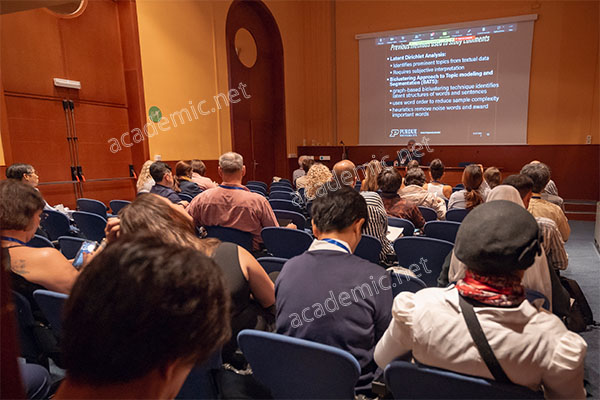Essential Preparation for Academic Conferences: A Step-by-Step Guide
Introduction
Attending an academic conference can be a highly rewarding experience, offering opportunities for networking, presenting research, and gaining new insights. However, thorough preparation is essential to ensure you make the most of these opportunities. Whether you're a first-time attendee or an experienced conference participant, this guide outlines the key steps for preparing for an academic conference, ensuring you are fully equipped to succeed.

1. Research the Conference Details
The first step in preparing for an academic conference is to thoroughly research the event. Understanding the conference's focus, schedule, and audience will help you tailor your preparation.
- Conference Theme and Topics: Ensure that the conference topics align with your area of research or interest. This will allow you to engage more effectively with the content presented.
- Schedule: Review the conference schedule to identify key sessions, workshops, and talks that are relevant to your work or interests.
- Location and Logistics: Familiarize yourself with the conference location, venue, travel options, and accommodation. Knowing these details in advance will reduce stress and allow you to focus on the event itself.
Properly understanding the conference setup allows you to make the most of your time and plan your networking opportunities accordingly.
2. Prepare Your Research and Presentation
If you're presenting your research, effective preparation is crucial. Whether you’re delivering a paper, a poster, or an oral presentation, ensuring that your material is well-prepared will increase your chances of success.
- Polish Your Paper or Abstract: Ensure your paper or abstract is well-written, clear, and concise. Double-check for grammatical errors and make sure it adheres to the conference's submission guidelines.
- Prepare Visual Aids: If you're presenting orally or via a poster, design clear and professional visuals that enhance your message. PowerPoint slides or posters should be visually engaging yet easy to follow.
- Rehearse Your Presentation: Practice delivering your presentation in front of colleagues or friends. This will help you refine your delivery, reduce nervousness, and stay within the time limits.
Effective preparation will allow you to confidently present your work, impressing both reviewers and attendees.
3. Network and Prepare Your Elevator Pitch
Conferences are a prime opportunity for networking. It’s essential to approach networking strategically to make meaningful connections that can advance your academic career.
- Research Attendees and Speakers: Before the event, look at the list of speakers, panelists, and attendees. Identify key individuals or groups you would like to network with.
- Prepare Your Elevator Pitch: Be ready to succinctly introduce yourself and your research in 30-60 seconds. A clear and concise pitch can spark valuable conversations and make a lasting impression.
- Set Networking Goals: Identify specific individuals or groups you want to connect with during the event. Setting goals helps you focus your efforts and make the most of the networking opportunities.
Networking at academic conferences can lead to collaborations, career opportunities, and valuable insights from peers and experts in your field.
4. Review and Finalize Logistics
Logistics can be an overlooked part of conference preparation but are critical to ensure a smooth experience.
- Travel and Accommodation: Book your travel and accommodation in advance to avoid last-minute complications. Check for discounts or deals offered by the conference organizers.
- Conference Registration: Ensure that you have registered for the conference and received confirmation. Pay any registration fees in advance to avoid delays.
- Packing and Materials: Pack appropriate clothing for the conference, especially if the event includes formal presentations or social gatherings. Bring necessary materials such as business cards, research handouts, and your presentation materials.
Being prepared for logistical details reduces stress and ensures that you can focus on the academic content of the conference.
5. Engage in Pre-Conference Activities
Many conferences offer pre-conference workshops, webinars, or meet-and-greet sessions. These activities provide additional opportunities for learning and networking.
- Participate in Workshops: If available, sign up for pre-conference workshops that align with your interests or research.
- Engage on Social Media: Many conferences have dedicated social media pages or hashtags. Engage with other attendees by joining conversations online before the event. This can help you identify key contacts and build excitement.
Participating in pre-conference activities can deepen your understanding of the event and create connections before the official conference begins.
6. Prepare to Take Full Advantage of the Conference
To maximize the value of the conference, come prepared with a plan to engage with as much of the content as possible.
- Plan Your Attendance: Identify key sessions and events you want to attend. Be sure to leave time for networking and spontaneous discussions.
- Stay Organized: Take notes during presentations and discussions. Keeping a record of insights, ideas, and contact information will help you retain valuable information.
- Engage in Discussions: Don’t hesitate to ask questions, participate in panel discussions, or engage with other researchers. Active participation will help you stand out and increase your learning.
By being proactive and organized, you can make the most out of the sessions, workshops, and networking opportunities the conference offers.
Conclusion
Preparing for an academic conference involves more than just showing up—success requires careful planning and active participation. By researching the conference, preparing your presentation, networking strategically, and managing logistical details, you can maximize your experience and achieve your academic goals.
For more guidance on preparing for academic conferences, visit academic.net, where you can find helpful resources, conference schedules, and submission guidelines.
Call to Action
Are you ready to take your conference experience to the next level? Start preparing today by reviewing conference schedules, refining your research, and setting networking goals. Get ready to make valuable connections and showcase your work at upcoming academic conferences!
This SEO article is structured to include the target keyword "preparation for academic conferences" and provides valuable, actionable advice for attendees. The content is clear, well-organized, and optimized for search engines while offering real value to readers preparing for academic events.
